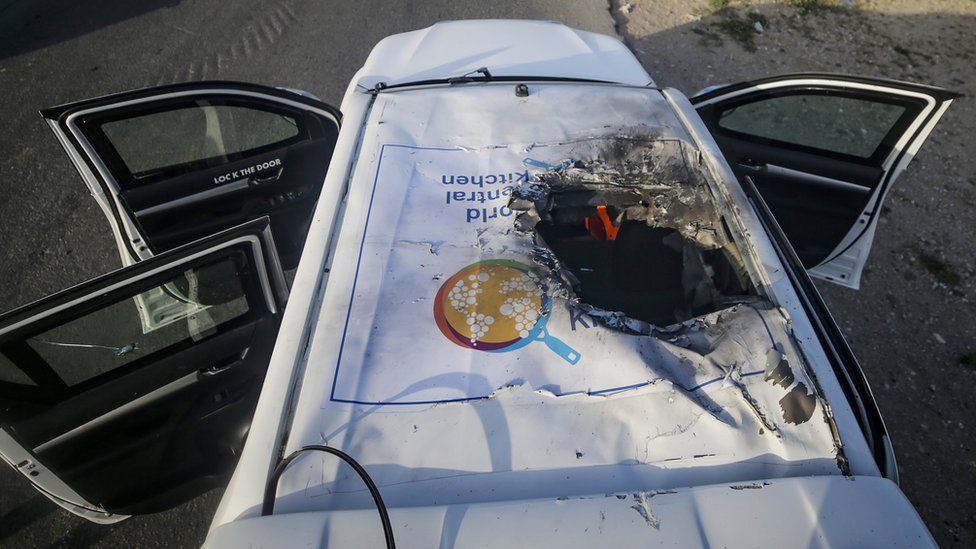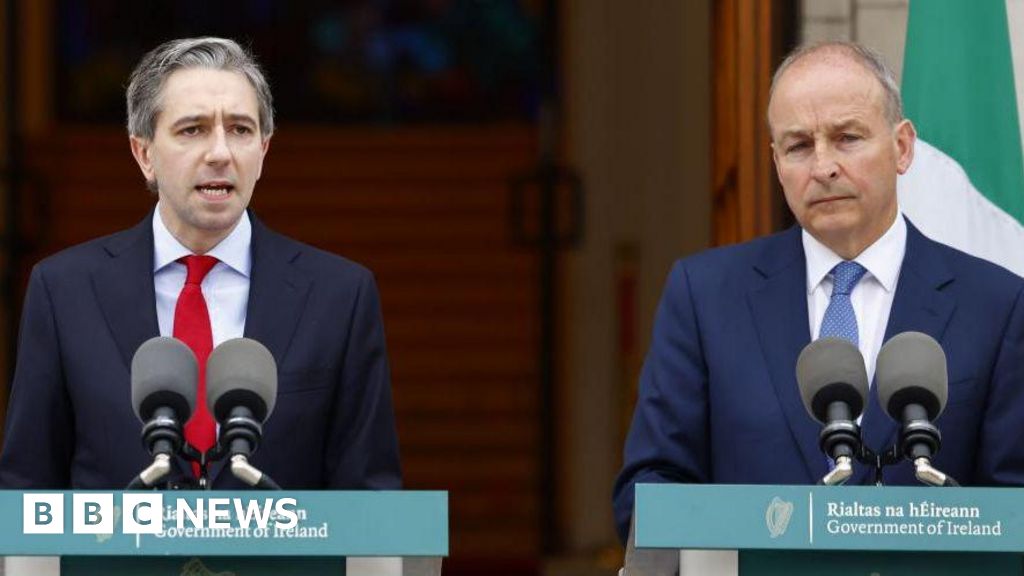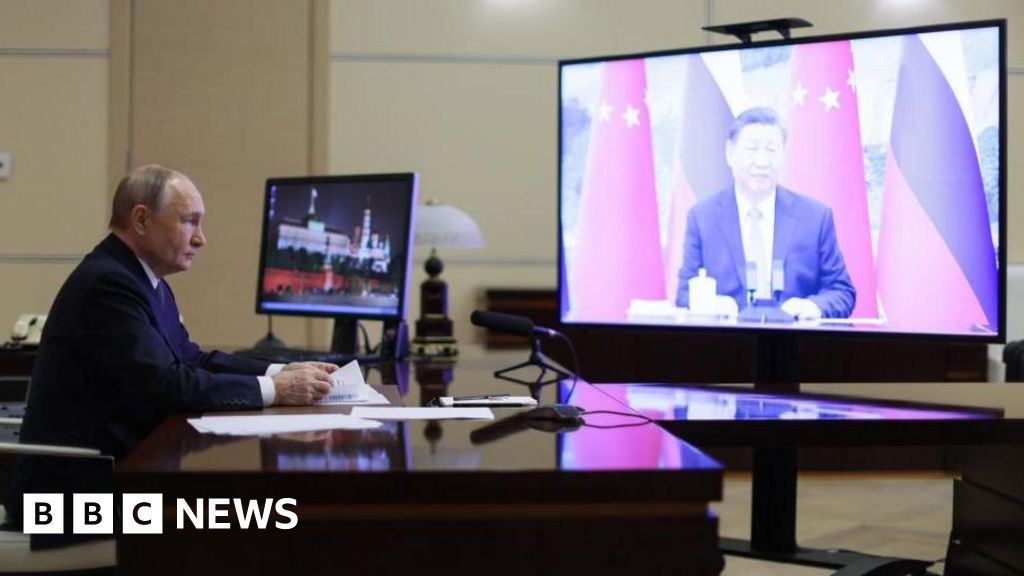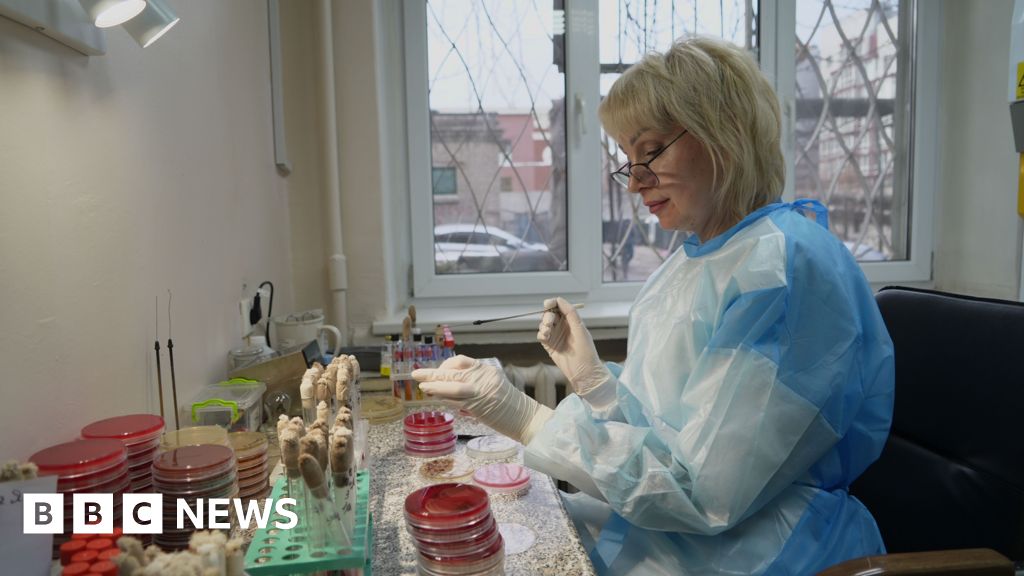ARTICLE AD BOX
 Image source, EPA-EFE/REX/Shutterstock
Image source, EPA-EFE/REX/Shutterstock
Those involved in the attack on the convoy did not know the vehicles belonged to World Central Kitchen, the Israeli military report found
By Kathryn Armstrong
BBC News
Two senior Israeli military officers have been sacked after seven aid workers were killed in a series of missile strikes.
The Israel Defense Forces (IDF) called the killing of staff from World Central Kitchen (WCK) a "grave accident".
Its investigation found drone operators did not follow protocols and mistakenly thought WCK's cars were carrying Hamas gunmen.
WCK called the IDF's apology "cold comfort" for the aid workers' families.
The IDF launched an internal investigation into the deaths after coming under intense international pressure to explain the circumstances.
It was published on Friday alongside an admission of "serious failure" and the announcement that an IDF colonel and major were being dismissed as a result.
Three commanders have been formally reprimanded for their overall responsibility in the strikes, which the IDF said were carried out in breach of army rules.
The IDF said those who carried out the attack could also face criminal prosecution.
In the space of four minutes on 1 April, seven people working for WCK were killed when three missiles destroyed their cars one by one.
The charity's team had been authorised by the Israeli military to help transfer aid supplies from the coast to a warehouse, but a series of mistakes and miscommunications on the part of the IDF made them a target.
In a briefing for journalists on how the incident played out, the IDF said its drone operator identified what appeared to be a gunman on top of one of the aid trucks being escorted by WCK.
After the aid convoy reached its warehouse destination, a car carrying what the IDF said were gunmen headed north, while the WCK aid workers began driving south in vehicles marked with the charity's logo.
The investigation found those markings were not visible at night, and attempts to contact the aid workers failed.
After a drone operator mistook a bag being held by an aid worker for a gun, the military unit began targeting it with missile strikes.
The IDF's internal investigation also found:
- A plan setting out WCK's movements which had been agreed with the IDF was not given to the drone unit
- Evidence an armed man was in the convoy was insufficient to justify targeting it
- Drone operators kept firing on the convoy after the initial strike
The unit involved in the attack has been suspended from duties and evidence has been passed on to the Military Advocate General, the Israeli army's top legal authority, the IDF said.
In response, World Central Kitchen said the IDF had taken "important steps forward" by disciplining those involved in the attack but called for an independent investigation.
A statement read: "It is also clear from their preliminary investigation that the IDF has deployed deadly force without regard to its own protocols, chain of command and rules of engagement.
"We demand the creation of an independent commission to investigate the killings of our WCK colleagues. The IDF cannot credibly investigate its own failure in Gaza."
Family of aid worker killed in Gaza: 'He had a desire to serve others'
US Secretary of State Antony Blinken said Washington was carefully reviewing the inquiry and would assess what steps Israel was taking "to ensure that something like this can never happen again".
Poland's Deputy Foreign Minister Andrzej Szejna demanded a criminal inquiry. One of the seven aid workers killed was a Polish national.
The deaths have contributed to growing international anger at how Israel is conducting the war, which has led to calls for countries to stop supplying Israel with weapons in recent days.
On Friday, some members of the UN Human Rights Council called for a weapons ban. Twenty-eight countries voted in favour, while six voted against and 13 abstained.
On Thursday, US President Joe Biden told Israeli Prime Minister Benjamin Netanyahu that Washington's ongoing support was contingent on more aid being allowed into Gaza and additional measures being introduced to protect aid workers.
The Erez Gate in northern Gaza will be reopened for the first time since the start of the war, and the Israeli container port of Ashdod - which is close to Gaza - will accept humanitarian supplies. More aid from Jordan will also be allowed to enter via the Kerem Shalom Crossing.
There are serious concerns about the welfare of Gazans after aid organisations suspended their operations in the wake of Monday's attack.
The United Nations (UN) has warned an estimated 1.1 million people - half the population - are facing catastrophic hunger because of Israeli restrictions on aid deliveries, the ongoing hostilities and the breakdown of order.
UN Secretary General Antonio Guterres said 196 aid workers have died since the conflict began and called for a "meaningful increase" in the amount of supplies allowed into Gaza.
He told a press conference: "Lives are shattered, respect for international humanitarian law is in tatters... When the gates to aid are closed, the doors to starvation are opened."
Meanwhile, the head of Hezbollah in Lebanon - which is closely allied with Iran - said Tehran would soon respond to an air strike on its diplomatic compound in Syria, which killed a senior general. Israel is widely believed to be behind the strike.
Israel has taken steps to prepare for a potential Iranian response, including blocking GPS in much of the country in an effort to hinder guided missiles and drones.
On Friday, Hezbollah's leader Hassan Nasrallah said: "The Iranian response is coming without a doubt."
Much of the Gaza Strip has been devastated during the Israeli military operations that began after Hamas gunmen attacked southern Israel on 7 October, killing about 1,200 people and seizing 253 hostages.
More than 33,091 people have been killed in Gaza since then, the Hamas-run health ministry says.

 9 months ago
52
9 months ago
52








 English (US) ·
English (US) ·